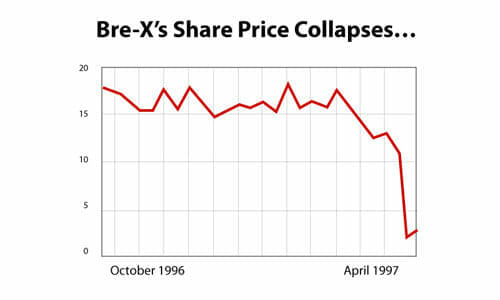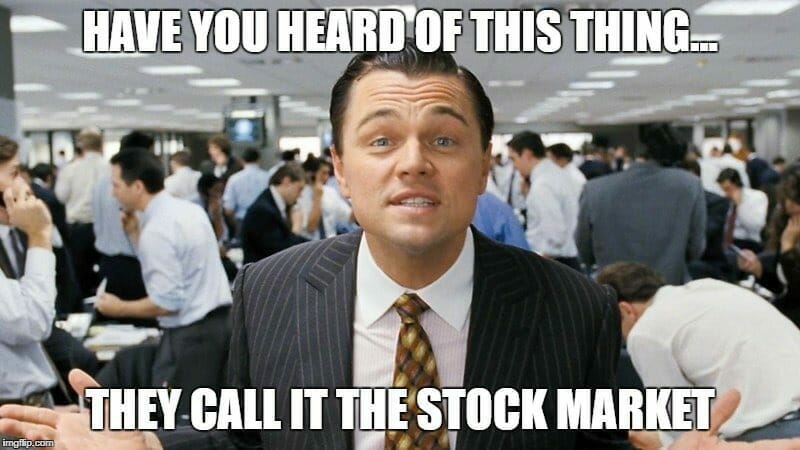Just over half of Americans invest actively in the stock market. Over 20 percent of those who don’t invest, do so because they don’t understand how the stock market works. Another 16 percent don’t invest because they feel like stocks are too risky or don’t trust brokers.
The truth is, buying stocks is one of the best paths to long-term wealth generation for individual investors like you but first, you need to understand how the market works. Remember when Grandpappy bought you that stock certificate for 5 shares in Procter and Gamble when you were 7?

All you wanted was a red toy truck, but instead, you had to learn what a dividend and stock ticker was. Lame! I can trace so many of your problems in life back to that one fateful Christmas morning. But this isn’t about me, it’s about you, and understanding how the market works.
Now that we’re older, we realize that old Grandpappy was onto something. Not just trying to give us some financial literacy, but giving us our first exposure to one of the biggest wealth engines of our times: the stock market.
The stock market can be an active or passive investment, depending on how involved you want to be, but one thing is for sure: it is one of the most popular investment vehicles in America. And, it’s better than doing nothing with your money.
How the stock market works
The best thing about the stock market is that buying stocks is an easy and accessible form of investment for people of all financial means. The stock market has something for everyone, low entry points for beginners, compound interest for long-term thinkers, and Bre-X for the suckers.

Ouch!
Despite its popularity among the public, few people actually know how the market works. Even the so-called investors in it.
Beginners may think its too complex to learn how the stock market works. Veteran investors may think if they haven’t learned by now, they won’t ever be able too. It is possible to learn, and the advantages of building this understanding can be immense for your investing future.
So, rather than go a day longer with a stab in the dark style of investing, let’s go through a primer of how the stock market works, and detail the essential information an investor needs to know to trade with confidence.
And, also you’ll have something to talk about at your next work party.

What is the stock market?
A stock market is a regulated exchange platform for the purchase and sale of individual stocks. A stock is a partial share in a company. Simple as that.
Stock markets exist for a number of reasons. The first and most obvious function is to be a hub for the exchange of stocks. Beyond this, stock market exchanges are essential to ensure that trading can operate securely, transparently, and fairly. Wouldn’t you want to buy stocks from Jax your high school weed dealer now, would you?

At its core, the stock market is an umbrella term for the collection of markets and exchanges where you can buy and sell stocks. The stock market is the backbone of our capitalist society and gives companies around the globe an opportunity to sell equity in their company for access to an ownership percentage.
And, it gives regular people like us the ability to own portions in a variety of companies.
Not all stock markets are made equal however, that is why prudent investors only trade on trusted stock exchanges.
At all costs, avoid the Pyongyang Stock Exchange (PSE), there’s only one winner in that market.

The NASDAQ, Canadian Securities Exchange (CSE), the Australian Stock Exchange (ASX), and the German Stock Exchange (DAX) are all examples of trusted and reputable stock markets. While every market can have some volatility and upheaval, as a general rule, democratic nations with a stable government will provide good long-term investment returns.
Get our best strategies, tools, and support sent straight to your inbox.
Why do companies issue stocks?
In order to understand how the market works, we must first know why a business trades away portions of its equity. A company will decide to list on the stock market as it seeks to raise capital for future growth, and in order to do that decides to sell off a part of the holding in the company to those who want to buy it.
This is where we get the term Initial Public Offering (IPO) from. Companies will go from privately owned, to publicly traded, through a process called an IPO. We all remember the media frenzy around Facebook’s IPO in 2012, where shares ended a volatile first trading day at $38.

By the way, Facebook finished off 2017 with a stock price of $178. Not a bad return if you were an initial investor in 2012. Go Zuks!

If you own a stock in a company, you literally own a fractional piece of equity in that company. A very small one of course.
When a company goes public, they become a public entity. Just like how it’s expected politicians (HA!) and judges conduct themselves according to rules and public interest – the same applies to a public business. And there are rules they have to live by.
Generally speaking, when it’s a private business, what happens behind the scenes is private. There is no expectation of making public what that company is doing. When a company goes public, they have to provide annual reports and conduct business in the interest of stockholders. That’s now you!
Specific reporting requirements can vary depending on specific stock markets, but the practice is almost universal.
An IPO gets stocks into circulation, and once circulating they become a part of what is called the secondary market. Once in the secondary market, stocks are traded between investors.
Investors who want to buy them, investors who want to sell them, as well as the more complex traders who want to engage in advanced trading strategies like buying options, penny stocks, and shorting stocks. And, don’t get us started on high-frequency trading.
But these are more advanced topics, for another time.
What you need to know about how the market works, is that once a company wants to go public, their shares become publicly tradable on what we call a stock market. The price varies day-to-day and depends on a number of factors including market volatility and the perceived value of the company in question.
What is a share?
A share is a piece of a company. Simple as that. A company issues shares to investors to raise money, typically through an IPO as discussed. While the company keeps the funds it made during the IPO, the shares are then sold on a stock market to people like us. The most popular of the stock market exchanges is the New York Stock Exchange (NYSE). Heard of it?
Shares of thousands of companies are traded on these exchanges. But how can you buy a share? We’re so glad you asked!
How to buy a stock
Once a company has raised its IPO, they no longer receive the proceeds of subsequent selling of its stock. This is why trading of stocks is often said to be on a secondary market, because it is now between investors, rather than the company selling them itself in an IPO.
Stock trading isn’t like in the old days with physical stock certificates (although they still exist in Grandpappy’s attic beside the first ballpoint pen and an old monocle), it’s now done through digital platforms, or what’s called a brokerage.
Traders and investors continue to buy and sell the stock of the company on the exchange, although the company itself no longer receives any money from this type of trading.
You can easily buy and sell stocks through an online brokerage like E*TRADE, TD Ameritrade, Questrade, among many others. Other options include robo-advisors, which take the money you’d like to invest, and put it into predetermined stocks and funds.
After signing up for a brokerage account, you need to decide on the company you want to buy, and their stock ticker symbol. For instance, Apple is AAPL, and Microsoft is MSFT, and Listen Money Matters is LMM. We asked for BDA$$, but it was taken.
How to ‘play’ the stock market
The market advantages patient traders. Someone who has the time to invest, park their money like an old bicycle outside a 7/11, and then just let it sit there for 20 years.
For all the heart-racing back and forth of ‘buy buy buy’ ‘sell sell sell’ you see in movies; most investors build their wealth through the phenomenon of capital gain, patience, and compound interest.
Despite market corrections, crashes, and outright shitstorms, over the long-term, the stock market always goes higher. The same isn’t true for individual stocks, many of which fall to zero. So the fella who invested his entire life savings into Enron in 2001…Well, that sucks dude!
The truth is, no matter how swish a pinstripe suit or high your turtleneck, it won’t mature your investment any faster.

As with anything in life, you need to educate yourself. You need to learn about how to value a company, which companies fit your investment strategy, and when to sell (or not sell) a stock that’s losing value.
If you want to start actively traded stocks you need to familiarize yourself with important topics such as market caps, price-to-earnings ratios, profit margins, and much more. Overwhelming? Let’s give you the basics.
Stock market basics: Indexes, dividends, and ETFs
Here are some of the most common stock market terms you’ll hear float around CNBC as you try to listen but can’t help but think Jim Cramer is about to punch you in the face.

- Bull Market: Things are good! The market in question is doing well and growing steadily.
- Bear Market: Shit’s bad! The market is losing value over time and people overall are selling their stocks, driving prices and value lower.
- ETFs: Exchange traded funds (ETFs) are baskets of stocks typically based on something in common – industry, commodity, currency, etc. – but can be any group of publicly traded assets. These are pooled stocks and equities and are not managed by anyone.
- Mutual Funds: These are funds, or baskets of equities, that are professionally managed by a fund manager, who takes a percentage.
- Dividend: A portion of profits paid out by a company to its shareholders on a recurring basis (typically quarterly). This is above the rise and fall of the stock price, so it’s a good idea for long-term investors to find good dividend-paying stocks.
- Short Selling: Instead of buying a stock thinking it will rise in value, if you short sell a stock it means that you are betting it will drop in price.
Final thoughts on how the market works
Once you understand how the market works, you will have the capacity to buy and trade stocks more effectively. All you need to know is that a stock market is an exchange platform (now digital) where investors like you or I can buy and sell portions of publicly traded companies. That’s it. Or, as Warren Buffett likes to put it:
The stock market is a device for transfering money from the impatient to the patient.
Once you understand this simple reality, you can more easily navigate the various stock markets and even trade individual stocks when the time comes. But, make sure to educate yourself before wasting your hard-earned income.
Oh ya, and those 5 Procter and Gamble stocks your Grandpappy bought you in 1978, have seen a gain of about 4000%. Who’s lame now?


